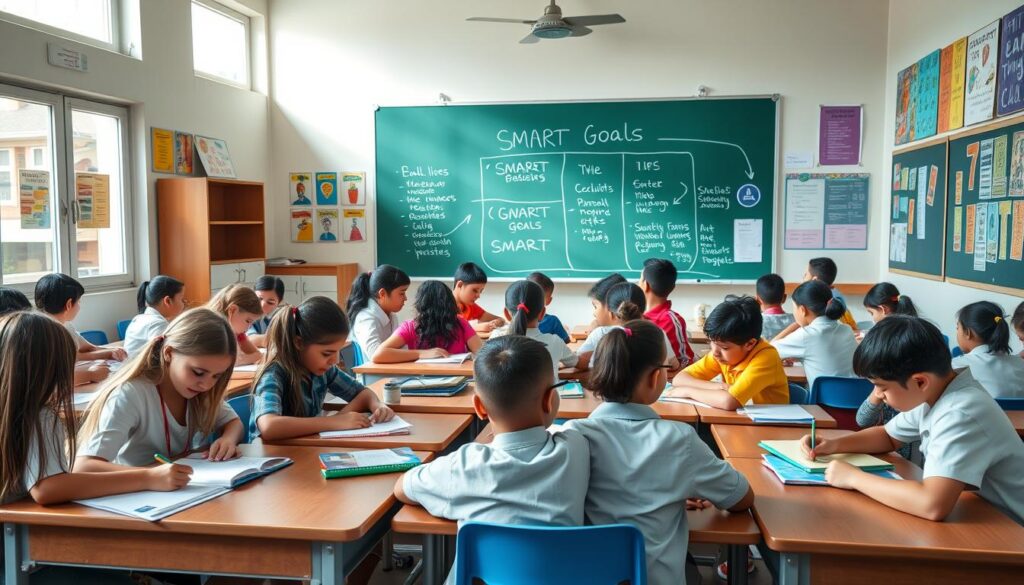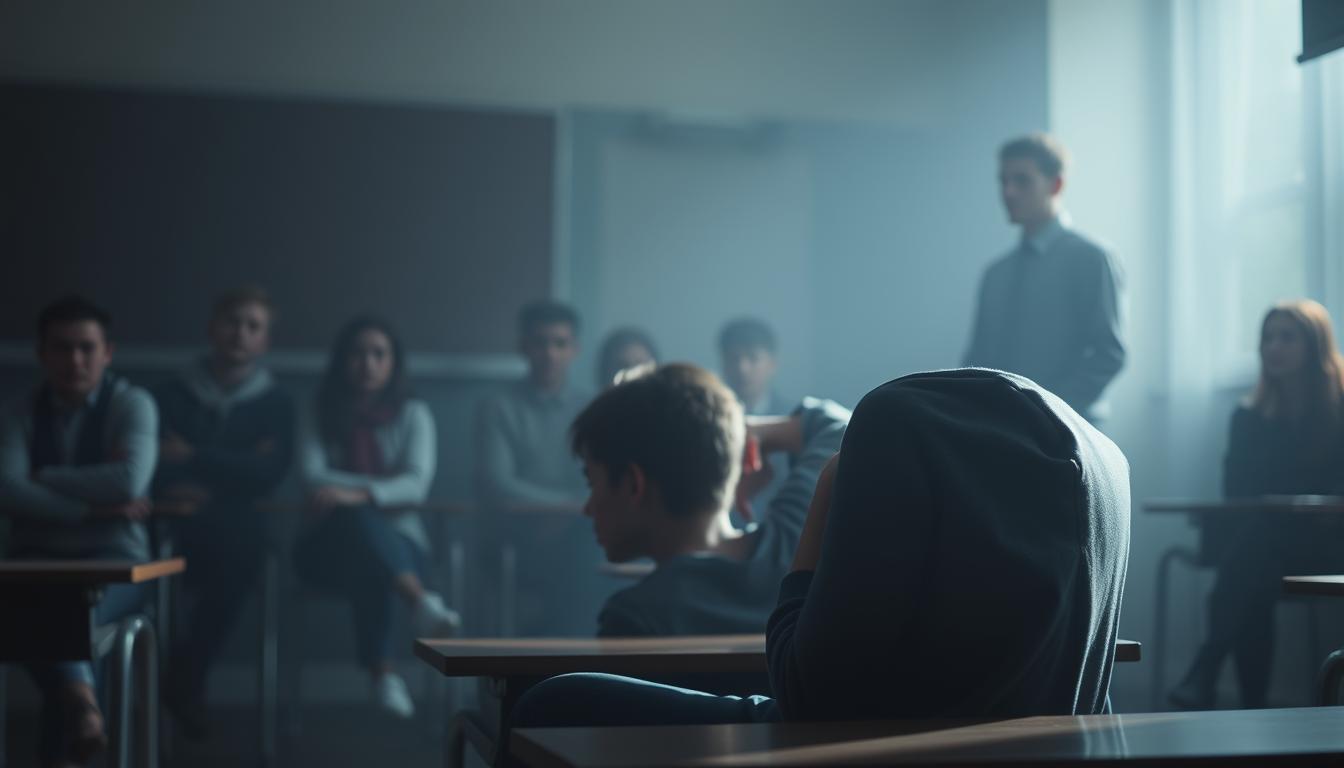As we start the new year, it’s a perfect time for school professionals to look back and plan ahead. Speech-Language Pathologists (SLPs), Occupational Therapists (OTs), School Psychologists, and Social Workers can reflect on their successes. They can also think about how to better support students, families, and teachers.
By setting goals and making connections, these professionals can really help students, families, and teachers. Their work is key to helping students succeed. As we start this new year, it’s important for them to work together. This way, they can give their students the best education and care.
Key Takeaways
- SLPs, OTs, School Psychologists, and Social Workers play a vital role in supporting students in a school setting.
- Setting goals and building connections can have a positive impact on students, families, and educators.
- These professionals can identify areas for improvement and develop strategies to enhance their practice.
- Collaboration among SLPs, OTs, School Psychologists, and Social Workers is essential for providing the best possible education and care for students.
- The new year is an ideal time for these professionals to reflect on past successes and set new goals for supporting students and families.
- By working together, SLPs, OTs, School Psychologists, and Social Workers can make a significant difference in the lives of their students.
Reflecting on Your Professional Journey in Education
As we welcome a new year, it’s a great time for school-based professionals to look back and plan ahead. Speech-language pathologists, occupational therapists, and education professionals can reflect on their successes and set new goals. Looking back helps identify areas for growth and development.
Evaluating past experiences helps professionals understand their strengths and weaknesses. This understanding leads to better strategies for improving their work. It shows how speech-language pathologists and occupational therapists can make a bigger difference in student success.
Evaluating Past Successes and Challenges
When evaluating past experiences, consider these factors:
- Student progress and outcomes
- Collaboration with other education professionals
- Family engagement and support
Identifying Areas for Growth and Development
After evaluating past successes and challenges, professionals can find areas for growth. They might seek more training or support. This could include workshops or mentoring programs to improve their skills.
Understanding Your Impact on Student Success
It’s vital for education professionals to understand their impact on students. Recognizing their role boosts motivation and job satisfaction. This leads to better outcomes for students.
The Vital Role of SLPs, OTs, School Psychologists, and Social Workers in Student Support
As we start the new year, it’s a great time for school professionals to look back and plan ahead. Speech-Language Pathologists (SLPs), Occupational Therapists (OTs), School Psychologists, and Social Workers are key in public school education. They help students face challenges and reach their highest potential.
The role of inhealth staffing is vital. It ensures schools get the right professionals for special services. These services include speech therapy, occupational therapy, and counseling. Together, these experts help students do well in school, socially, and emotionally.
Here are some ways these professionals support students:
- They offer one-on-one therapy and support.
- They work with teachers to find ways to help students.
- They help families find resources and support.
- They teach students important social and emotional skills.
We must recognize the important role of SLPs, OTs, School Psychologists, and Social Workers. They make sure all students get the help they need to succeed. This includes inhealth staffing and special services tailored to each student’s needs. It also supports the critical work these professionals do in public school education.
| Professional | Role | Services Provided |
|---|---|---|
| SLPs | Speech-Language Pathologists | Speech therapy, language therapy |
| OTs | Occupational Therapists | Occupational therapy, sensory integration |
| School Psychologists | School Psychologists | Counseling, assessment, consultation |
| Social Workers | Social Workers | Counseling, case management, advocacy |
Creating SMART Goals for the New Year

As we start the new year, it’s a great time for school professionals to think about their past successes. Speech-Language Pathologists, Occupational Therapists, School Psychologists, and Social Workers can reflect on their achievements. They can then set goals to help students in school setting succeed.
Creating SMART (Specific, Measurable, Achievable, Relevant, Time-bound) goals is key. This way, education professionals can make a real difference in student success.
To make SMART goals, follow these steps:
- Find areas where you can improve, like making students in school setting plans more personal
- Set clear, measurable goals, like getting more students to join in class
- Make sure your goals are achievable and relevant, like getting more training for education professionals
- Set deadlines, like checking in every quarter to see how you’re doing
By taking these steps and setting SMART goals, education professionals can really help students in school setting. They can make the learning environment better and more supportive.
Building Stronger Relationships with Students and Families
As we start the new year, it’s a great time for school professionals to think about what they’ve done well and what they can improve. Building stronger relationships with students and families is key to helping students do well. Social workers and school psychologists are especially important in this area, helping both students and families.
To strengthen these bonds, it’s important to know what students and families need. This can be done by:
- Creating open lines of communication
- Offering emotional support and counseling
- Helping families find community resources
School psychologists and social workers can team up to offer full support services. They address students’ academic, social, and emotional needs.
By working together, social workers and school psychologists can help students and families overcome obstacles. Let’s focus on building stronger relationships in the new year. This way, we can support them in achieving their goals.
Enhancing Collaboration Among Education Professionals
As we start the new year, it’s a great time for professionals in schools to look back and plan ahead. Speech-language pathologists and occupational therapists should think about how they can help students, families, and teachers. Working together is key to helping students succeed.
Good teamwork means using cross-disciplinary communication strategies. This helps everyone share ideas and skills. It’s done through team meetings, learning together, and keeping open lines of communication.
Cross-Disciplinary Communication Strategies
Here are some ways to improve teamwork:
- Creating a common language and way of working together
- Encouraging everyone to listen well and understand each other
- Building a respectful and trustworthy team environment
Team Building Approaches
There are also team-building activities that help professionals work better together. These can include team exercises, social events, and projects that help the community.
| Professional Role | Contribution to Student Success |
|---|---|
| Speech-Language Pathologists | Supporting students with communication disorders |
| Occupational Therapists | Helping students develop skills for daily living and academic success |
By working together and sharing their knowledge, professionals can offer more support to students and families. This leads to better results and a more rewarding school experience for everyone.
Conclusion: Embracing New Opportunities for Growth and Impact
As we start the new year, it’s a great time for school professionals to look back and plan ahead. Speech-Language Pathologists, Occupational Therapists, School Psychologists, and Social Workers can reflect on their successes. They also set goals to help students, families, and teachers.
Their work in public school education, inhealth staffing, and special services is key to student success. By setting SMART goals and building strong relationships, they can make a bigger difference. The new year offers chances to grow and help students in new ways.
By using what they’ve learned before, these professionals can achieve more. They will positively impact the lives of the students they support. This will help them reach new heights and make a bigger difference.




